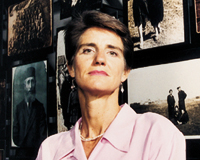![]()

“Learning from Post-World War II Germany”
UMBC faculty are recognized for creating new perspectives in history and often help shape the present and future by serving as advisors to governmental and organizational programs.
Rebecca Boehling, associate professor and graduate director in the Department of History, is researching denazification in post-World War II Germany under Allied occupation. Denazification was an important part of the Allies’ program to transform Germany from an authoritarian state into a democratic nation that would again cooperate in international life. Boehling proposes that because there was not a structural change-oriented, consistent approach to denazification during the U.S. occupation period, there were lasting repercussions for postwar German society as well as for the victims of Nazism and the international community.
She is currently serving on an historians’ advisory panel to the U.S. government that helps oversee the declassification of U.S. government documents related to Nazi and Imperial Japanese war crimes committed during World War II. This declassification project is based on the Nazi War Crimes Disclosure Act that former President Clinton signed into law in January 1999.
In the fall of 2000, Boehling received a fellowship at the Center for Advanced Holocaust Studies, part of the United States Holocaust Museum in Washington, D.C. She says, “The invited lecture that I gave on denazification prior to my fellowship drew a considerable audience. In fact, it was this experience and the many follow-up inquiries from the audience, journalists and Justice Department officials that convinced me this was a topic that Americans wanted and needed to understand better. That was why I decided to apply for the fellowship.
Boehling was able to help museum staff answer inquiries from Holocaust survivors and their families about the denazification process itself as well as about where records of individual denazification proceedings could be found. After starting the research there, she went on last summer to begin the primary research in archives in Germany, where she hopes to return this summer.
Boehlings work on denazification is intended to result in a book that compares the practice in the three Western zones (British, French, U.S.) of occupied Germany from 1945 until 1952.
